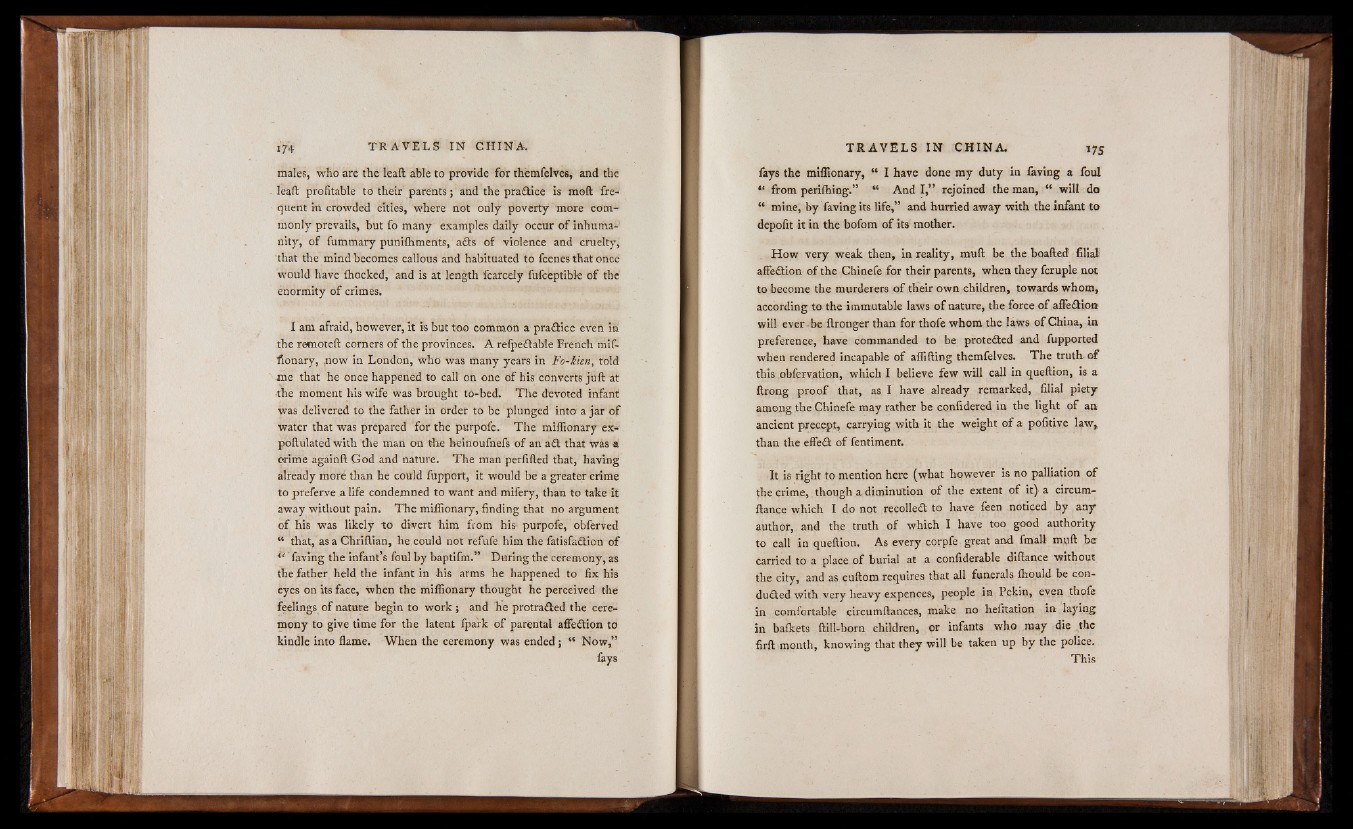
males, who are the leaft able to provide for themfelves, and the
leaft profitable to their parents; and the pradice is moft frequent
in crowded cities, where not only poverty more commonly
prevails, but fo many examples daily occur o f inhumanity,
o f fummary punilhments, ads of violence and cruelty,
that the mind becomes callous and habituated to fcenes that once
would have fhocked, and is at length fcarcely fufceptible o f the
enormity o f crimes.
I am afraid, however, it is but too common a practice even in
the retnoteft corners o f the provinces. A refpedable French tnif-
fionary, .now in London, who was many years in Fo-kien, told
me that he onGe happened to call on one o f his converts jiift at
the moment his wife was brought to-bed. The devoted infant
was delivered to the father in order to be plunged into a jar o f
water that was prepared for the purpofe. The miffionary ex*
poftulated with the man on the heinoufnefs o f an a d that was *
crime againft God and nature. The man perfifted that, having
already more than he could fupport, it would be a greater crime
to prefer.ve a life condemned to want and mifery, than to take it
away without pain. The miffionary, finding that no argument
o f his was likely to divert him from his- purpofe, obferved
“ that, asaChriftian, he could not refufe. him the fatisfadion o f
“ faving the infant’s foul by baptifm.” During the ceremony, as
the father held the infant in his arms he happened to fix his
eyes on its face, when the miffionary thought he perceived the
feelings o f nature begin to work ; and he protrailed the ceremony
to give time for the latent fpa'rk o f parental affedion to
kindle into flame. When the ceremony was endedj “ Now,”
feys
fays the miffionary, “ I have done my duty in faving a foul
“ from periflring.” “ And I,” rejoined the man, “ will do
“ mine, by faving its life,” and hurried away with the infant to
depofit it in the bofom o f its mother.
H ow very weak then, in reality, muft be the boafted filial
affedion o f the Chinefe for their parents, when they fcruple not
to become the murderers o f their own children, towards whom,
according to the immutable laws o f nature, the force o f affedion
will ever -be ftronger than for thofe whom the laws o f China, in
preference, have commanded to be proteded and fupported
when rendered incapable o f affifting themfelves. The truth o f
this obfervation, which I believe few will call in queftion, is a
Itrong p roo f that, as I have already remarked, filial piety
among the Chinefe may rather be confidered in the light o f an
ancient precept, carrying with it the weight o f a pofitive law,
than the effed o f fentiment.
It is right to mention here (what however is no palliation o f
the crime, though a diminution o f the extent o f it} a circum-
ftance which I do not recoiled to have feen noticed by any
author, and the truth o f which I have too good authority
to call in queftion. As every corpfe great and fmall muft be
carried to a place, o f burial at a confiderable diftance without
the city, and as cuftom requires that all funerals Ihould be con-
duded with very heavy expences, people in Pekin, even thofe
in comfortable circumftances, make no hefttatian in laying
in bafkets ftill-born children, or infants who may die the
firft month, knowing that they will be taken up by the police.
This